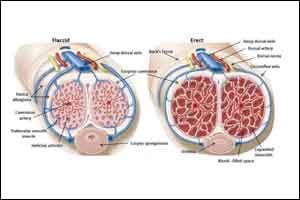- Home
- Editorial
- News
- Practice Guidelines
- Anesthesiology Guidelines
- Cancer Guidelines
- Cardiac Sciences Guidelines
- Critical Care Guidelines
- Dentistry Guidelines
- Dermatology Guidelines
- Diabetes and Endo Guidelines
- Diagnostics Guidelines
- ENT Guidelines
- Featured Practice Guidelines
- Gastroenterology Guidelines
- Geriatrics Guidelines
- Medicine Guidelines
- Nephrology Guidelines
- Neurosciences Guidelines
- Obs and Gynae Guidelines
- Ophthalmology Guidelines
- Orthopaedics Guidelines
- Paediatrics Guidelines
- Psychiatry Guidelines
- Pulmonology Guidelines
- Radiology Guidelines
- Surgery Guidelines
- Urology Guidelines
Hospitals bombarded with men with erections that do not go down!

A new study finds that emergency units in U.K are under a mounting pressure from men with erections that will not go down- a condition called Priapism.
According to available statistics ,the number of admissions shot up to a record 346 last year a 51 per cent rise on a decade earlier.
The possible cause of this according to experts is that more and more young men have got addicted to drugs such as cocaine, crystal meth, cannabis.In addition to this if they take drugs like Viagra ,with the combination they may land up in hospital with problem of painful erections for hours.In such an eventuality the treating doctors may even need to drain their penises to stop scarring and impotence.
Dr Geoff Hackett, former chief of the British Society of Sexual Medicine, said the condition called priapism often happened when fellas cannot rise to the occasion after booze and drugs, and then take Viagra.He said: “The risk as a result of Viagra alone is almost non–existent.But as the drug’s become cheaper, there is a chance people are more likely to exceed the recommended dose.”
Priapism most common in men in their 30s, is a prolonged , usually painful erection of the penis which may continue hours beyond or isn't caused by sexual stimulation. Although priapism is an uncommon condition overall, it occurs commonly in certain groups, which have Blood-related diseases like Sickle cell anemia, Leukemia or Other hematologic dyscrasias, such as thalassemia and multiple myeloma when blood isn't able to flow out of the penis. It is a possible side effect of a number of drugs, including,Medications injected directly into the penis to treat erectile dysfunction such as alprostadil, papaverine etc,Antidepressants, such as fluoxetine ,Alpha blockers including prazosin etc.,Medications used for psychotic disorders like hydroxyzine, risperidone etc.Blood thinners, such as warfarin (Coumadin) and heparin,Hormones such as testosterone or gonadotropin-releasing hormone and Medications used to treat attention-deficit/

Disclaimer: This site is primarily intended for healthcare professionals. Any content/information on this website does not replace the advice of medical and/or health professionals and should not be construed as medical/diagnostic advice/endorsement or prescription. Use of this site is subject to our terms of use, privacy policy, advertisement policy. © 2020 Minerva Medical Treatment Pvt Ltd